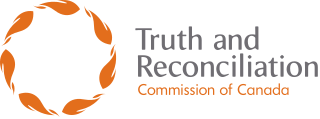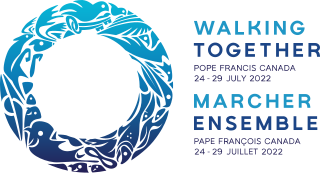
Larry Phillip Fontaine, is an Indigenous Canadian leader and former National Chief of the Assembly of First Nations. He best known for his central role in raising public awareness of the Canadian Indian residential school system and pushing to secure Federal and Papal apologies in 2008 and 2022 respectively. He also helped secure a repudiation of Discovery doctrine from Pope Francis on March 30, 2023.

The CanadianIndian residential school system was a network of boarding schools for Indigenous peoples. The network was funded by the Canadian government's Department of Indian Affairs and administered by Christian churches. The school system was created to isolate Indigenous children from the influence of their own culture and religion in order to assimilate them into the dominant Canadian culture. Over the course of the system's more than hundred-year existence, around 150,000 children were placed in residential schools nationally. By the 1930s, about 30 percent of Indigenous children were attending residential schools. The number of school-related deaths remains unknown due to incomplete records. Estimates range from 3,200 to over 30,000, mostly from disease.
The 1969 White Paper was a policy paper proposal set forth by the Government of Canada related to First Nations. Prime Minister Pierre Trudeau and his Minister of Indian Affairs, Jean Chrétien, issued the paper in 1969. The White Paper proposed to abolish all legal documents that had previously existed, including the Indian Act, and all existing treaties within Canada, comprising Canadian Aboriginal law. It proposed to assimilate First Nations as an ethnic group equal to other Canadian citizens. The White Paper was met with widespread criticism and activism, causing the proposal to be officially withdrawn in 1970.

The Kamloops Indian Residential School was part of the Canadian Indian residential school system. Located in Kamloops, British Columbia, it was once the largest residential school in Canada, with its enrolment peaking at 500 in the 1950s. The school was established in 1890 and operated until 1969, when it was taken over from the Catholic Church by the federal government to be used as a day school residence. It closed in 1978. The school building still stands today, and is located on the Tk’emlúps te Secwépemc First Nation.

The Truth and Reconciliation Commission of Canada was a truth and reconciliation commission active in Canada from 2008 to 2015, organized by the parties of the Indian Residential Schools Settlement Agreement.
The Sixties Scoop, also known as The Scoop, was a period in which a series of policies were enacted in Canada that enabled child welfare authorities to take, or "scoop up," Indigenous children from their families and communities for placement in foster homes, from which they would be adopted by white families. Despite its name referencing the 1960s, the Sixties Scoop began in the mid-to-late 1950s and persisted into the 1980s.
The history of the First Nations is the prehistory and history of present-day Canada's peoples from the earliest times to the present day with a focus on First Nations. The pre-history settlement of the Americas is a subject of ongoing debate. First Nation's oral histories and traditional knowledge, combined with new methodologies and technologies —used by archaeologists, linguists, and other researchers—produce new—and sometimes conflicting—evidence.

Missing and Murdered Indigenous Women (MMIW) also known as Missing and Murdered Indigenous Women and Girls (MMIWG) and more broadly as Missing and Murdered Indigenous Relatives (MMIR) or Missing and Murdered Indigenous People (MMIP) is a human rights crisis of violence against Indigenous women in Canada and the United States,notably those in the FNIM and Native American communities, but also amongst other Indigenous peoples such as in Australia and New Zealand, and the grassroots movement to raise awareness of MMIW through organizing marches; building databases of the missing; holding local community, city council, and tribal council meetings; and conducting domestic violence trainings and other informational sessions for police.

The National Day for Truth and Reconciliation, originally and still colloquially known as Orange Shirt Day, is a Canadian holiday to recognize the legacy of the Canadian Indian residential school system.
Indian City is a Canadian folk-rock musical group best known for their 2017 Juno Award–nominated album Here & Now. Originally formed as a side project by Vince Fontaine of the band Eagle & Hawk, Indian City is a rotating musical collective sometimes described as "a sort of indigenous version of Broken Social Scene". Members and contributors have included Don Amero, William Prince, Jim Cuddy, Chantal Kreviazuk, Pamela Davis, Gabrielle Fontaine, Neewa Mason, Marty Chapman, Atik Mason, Gerry Atwell, Jamie Carrasco, Jay Bodner, Jeremy Koz, Rena Semenko, Steve Broadhurst, Rich Reid, and Shannon McKenney.

Marie Wilson is a journalist and public administrator who served as one of three commissioners of the Truth and Reconciliation Commission of Canada (TRC). Born in Petrolia, Ontario, Wilson holds a Bachelor of Arts degree in French language and literature and a Master of Arts degree in journalism, both from the University of Western Ontario. She spent over 35 years working in journalism for the Canadian Broadcasting Corporation, including as regional director for CBC North and as adviser to the South African Broadcasting Corporation. In 2015, she served as a professor of practice at McGill University. Prior to her appointment to the TRC, she was employed by the Workers' Safety and Compensation Commission of the Northwest Territories as vice president for operations.
Ryan McMahon is an Anishinaabe comedian, podcaster, and writer from the Couchiching First Nation. McMahon was born in Fort Frances, Ontario, the oldest of three siblings. McMahon was the first in his family to graduate from high school. He graduated from the Second City Training Center.
Carol Rose GoldenEagle is a writer and broadcaster, from Saskatchewan.

Glen Sean Coulthard is a Canadian scholar of Indigenous studies who serves as an associate professor in the political science department at the University of British Columbia. A member of the Yellowknives Dene First Nation, he is also a co-founder, educator, and on the board of directors at Dechinta: Centre for Research and Learning. He is best known for his 2014 book, Red Skin, White Masks: Rejecting the Colonial Politics of Recognition, which has been released in both English and French.

Loretta Saunders was an Inuk woman who lived in Halifax, Nova Scotia. She was a St. Mary's University criminology student writing an honors thesis on Missing and Murdered Indigenous Women in Canada. Saunders was last seen on February 13, 2014. She was reported missing on February 17, and her body was found on February 26 near Salisbury, New Brunswick.

Rebecca Sockbeson is a Wabanaki scholar and activist in the field of Indigenous Peoples' education.

The foreign policy of Justin Trudeau is Canada's foreign policy since Justin Trudeau became Prime Minister in November 2015. Mélanie Joly has served as the Minister of Foreign Affairs since October 2021.

The Marieval Indian Residential School was part of the Canadian Indian residential school system. Located on the Cowessess 73 reserve in Marieval, Saskatchewan, it operated from 1898 to 1997. It was located in Qu'Appelle Valley, east of Crooked Lake and 24 km (15 mi) north of Broadview.
The Canadian Indian residential school system were a network of boarding schools for Indigenous peoples. Directed and funded by the Department of Indian Affairs, and administered mainly by Christian churches, the residential school system removed and isolated Indigenous children from the influence of their own native culture and religion in order to forcefully assimilate them into the dominant Canadian culture. Given that most of them were established by Christian missionaries with the express purpose of converting Indigenous children to Christianity, schools often had nearby mission churches with community cemeteries. Students were often buried in these cemeteries rather than being sent back to their home communities, since the school was expected by the Department of Indian Affairs to keep costs as low as possible. Additionally, occasional outbreaks of disease led to the creation of mass graves when the school had insufficient staff to bury students individually.

Pope Francis visited Canada from July 24 to 29, 2022, with stops in the provinces of Alberta and Quebec and the territory of Nunavut. The trip mainly focused on apologizing for the Catholic Church's role in the Canadian Indian residential school system and on reconciliation with the country's Indigenous peoples. It was the first papal visit to Canada since 2002, when Pope John Paul II visited Toronto for World Youth Day.













